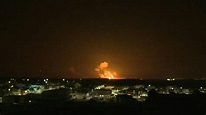Featured
article
- Get link
- X
- Other Apps
Escalation in the Gulf: A Defining Moment in Trump’s Foreign Policy

In a move that reverberated across global capitals, the Trump administration authorized military strikes on Iranian assets, marking one of the most consequential and high-stakes decisions of his presidency. The action followed mounting tensions in the Gulf region, fueled by accusations that Tehran had been behind attacks on oil tankers and U.S. surveillance drones.
The strikes, though limited in scope, carried profound implications. They underscored President Trump’s unpredictable approach to international conflicts—eschewing prolonged military campaigns while simultaneously projecting strength. Critics argue this gamble risked spiraling into a broader conflict, destabilizing an already volatile region and drawing the U.S. deeper into Middle Eastern power struggles.
Supporters, on the other hand, viewed the strikes as a necessary assertion of American resolve in the face of escalating provocation. The episode crystalized the administration’s approach: heavy on deterrence, light on diplomacy, and deeply reliant on the president’s instinct-driven decision-making.
Whether the move succeeded in altering Tehran’s calculus remains uncertain. But one thing is clear—this marked a pivotal chapter in the Trump administration’s legacy on the world stage.
Popular Posts
Trump's Six Words: "I'm Going to Stop the Wars"
- Get link
- X
- Other Apps
Midnight Blast Shakes Gaza Skyline Amid Rising Tensions
- Get link
- X
- Other Apps



Comments
Post a Comment